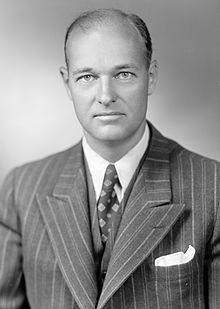
Back Artikel X Afrikaans X-Artikel German Το μακρύ τηλεγράφημα Greek Las fuentes del comportamiento soviético Spanish מאמר X HE X論文 Japanese X-artikel Dutch X-artikkelen NB Artigo X Portuguese X-artikeln Swedish

The "X Article" is an article, formally titled "The Sources of Soviet Conduct", written by George F. Kennan and published under the pseudonym "X" in the July 1947 issue of Foreign Affairs magazine. It widely introduced the term "containment" and advocated for its strategic use against the Soviet Union. It expanded on ideas expressed by Kennan in a confidential February 1946 telegram, formally identified by Kennan's State Department number, "511", but informally dubbed the "long telegram" for its size.
Kennan composed the long telegram to respond to inquiries about the implications of a February 1946 speech by Joseph Stalin.[note 1] Though the speech was in line with previous statements by Stalin, it provoked fear in the American press and public; Time magazine called it "the most warlike pronouncement uttered by any top-rank statesman since V-J Day".[4] The long telegram explained Soviet motivations by recounting the history of Russian rulers as well as the ideology of Marxism–Leninism. It argued that the Soviet leaders used the ideology to characterize the external world as hostile, allowing them to justify their continued hold on power despite a lack of popular support. Washington bureaucrats quickly read the confidential message and accepted it as the best explanation of Soviet behavior. The reception elevated Kennan's reputation within the State Department as one of the government's foremost Soviet experts.
After hearing Kennan speak about Soviet foreign relations at the Council on Foreign Relations in January 1947, international banker R. Gordon Wasson suggested that he share his views in an article for Foreign Affairs. Kennan revised a piece he had submitted to Secretary of the Navy James Forrestal in late-January 1947, but his role in government precluded him from publishing under his name. His superiors granted him approval to publish the piece provided it was released anonymously; Foreign Affairs attributed the article only to "X". Expressing similar sentiments to that of the long telegram, the piece was strong in its anti-communism, introducing and outlining a basic theory of containment. The article was widely read; though it does not mention the Truman Doctrine, having mostly been written before Truman's speech, it quickly became seen as an expression of the doctrine's policy. Retrospective commentators dispute the impact of the article; Henry Kissinger referred to it as "the diplomatic doctrine of the era",[5] while some historians write that its impact in shaping governmental policy has been overstated.
- ^ Kennan 1983, quoted in Gaddis 2011, p. 216.
- ^ Gaddis 2011, p. 216.
- ^ Gaddis 2011, p. 718n40.
- ^ Gaddis 2011, p. 227.
- ^ Kissinger 1979, p. 135, quoted in Gaddis 2011, p. 249.
Cite error: There are <ref group=note> tags on this page, but the references will not show without a {{reflist|group=note}} template (see the help page).
© MMXXIII Rich X Search. We shall prevail. All rights reserved. Rich X Search